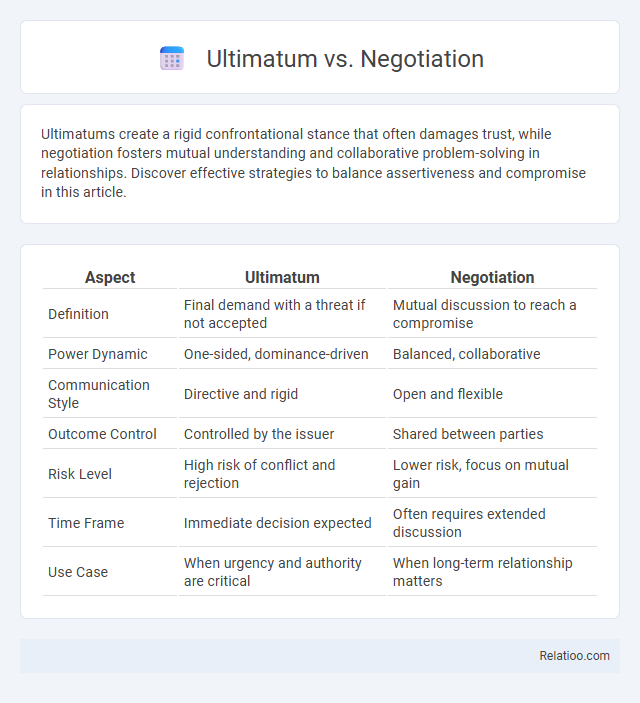Ultimatums create a rigid confrontational stance that often damages trust, while negotiation fosters mutual understanding and collaborative problem-solving in relationships. Discover effective strategies to balance assertiveness and compromise in this article.
Table of Comparison
| Aspect | Ultimatum | Negotiation |
|---|---|---|
| Definition | Final demand with a threat if not accepted | Mutual discussion to reach a compromise |
| Power Dynamic | One-sided, dominance-driven | Balanced, collaborative |
| Communication Style | Directive and rigid | Open and flexible |
| Outcome Control | Controlled by the issuer | Shared between parties |
| Risk Level | High risk of conflict and rejection | Lower risk, focus on mutual gain |
| Time Frame | Immediate decision expected | Often requires extended discussion |
| Use Case | When urgency and authority are critical | When long-term relationship matters |
Understanding Ultimatums: Definition and Context
Ultimatums represent a final demand or statement of terms, where rejection typically leads to consequences without further negotiation, distinguishing them from traditional negotiation processes that involve dialogue and compromise. Understanding ultimatums requires recognizing their role as non-negotiable boundaries set in conflict resolution, diplomatic exchanges, or business dealings. These rigid stances often escalate tensions and reduce opportunities for collaborative problem-solving, contrasting with the flexible and iterative nature of negotiation strategies.
The Essence of Negotiation: Key Principles
The essence of negotiation lies in mutual understanding, effective communication, and finding a balanced agreement that satisfies all parties involved. Unlike ultimatums, which impose rigid demands and limit flexibility, negotiation emphasizes collaboration and problem-solving to achieve win-win outcomes. Key principles include active listening, empathy, and the willingness to compromise to create sustainable and positive relationships.
Ultimatum vs Negotiation: Core Differences
Ultimatum and negotiation represent two distinct approaches to conflict resolution, where negotiation involves open dialogue and mutual compromise to reach a shared agreement, while an ultimatum imposes a final demand with limited or no room for discussion. Your ability to engage in negotiation fosters collaboration and long-term positive relationships, whereas relying on ultimatums can lead to tension, resistance, and potential breakdown of communication. Understanding the core differences between these methods empowers you to choose more effective strategies for resolving disputes and achieving desired outcomes.
Psychological Impact of Ultimatums
Ultimatums often trigger a psychological defense mechanism characterized by feelings of pressure, resentment, or resistance, which can hinder effective resolution and cooperation. Unlike negotiation, which encourages open communication and mutual understanding, ultimatums limit choices and can escalate conflict, negatively impacting your ability to reach a satisfactory agreement. Understanding the psychological impact of ultimatums is essential for managing interpersonal dynamics and fostering constructive dialogue.
Power Dynamics in Negotiation
Ultimatum in negotiation often represents a display of power where one party imposes terms with little room for flexibility, signaling a hierarchical dynamic. Negotiation, by contrast, typically involves a reciprocal exchange of information and concessions, fostering a more balanced power relationship aimed at mutual benefit. Understanding these power dynamics is crucial for strategizing effective negotiation tactics, as reliance on ultimatums can lead to resistance or breakdowns in communication, while collaborative negotiation can enhance trust and long-term partnerships.
When to Use an Ultimatum in Conflict
An ultimatum is appropriate in conflict situations where clear boundaries and non-negotiable demands are essential to prevent further harm or delay resolution. You should use an ultimatum when previous negotiation attempts have failed, and immediate action is required to protect your interests or well-being. Employing an ultimatum signals seriousness and urgency, often compelling the other party to make decisive choices without ambiguity.
Building Win-Win Outcomes Through Negotiation
Building win-win outcomes through negotiation requires understanding that an ultimatum imposes a take-it-or-leave-it stance, often limiting collaboration and mutual benefit. Effective negotiation prioritizes open communication, flexibility, and finding common ground to ensure both parties achieve valuable results. Your ability to engage in genuine dialogue fosters trust and creative problem-solving, ultimately leading to sustainable agreements that satisfy all involved.
Risks and Consequences of Ultimatums
Ultimatums often escalate conflicts by creating a rigid, non-negotiable stance that can damage relationships and stall progress. Unlike negotiation, which encourages dialogue and compromise, ultimatums impose strict demands that risk provoking resentment or defiance. Your approach should weigh these risks carefully, as choosing an ultimatum may lead to lost opportunities and long-term consequences for trust and collaboration.
Effective Strategies for Successful Negotiations
Effective strategies for successful negotiations involve understanding the distinct roles of ultimatums and negotiation techniques. While ultimatums present non-negotiable demands that can pressure parties into immediate decisions, negotiation focuses on collaborative problem-solving and mutual benefit. Utilizing clear communication, active listening, and flexibility enhances negotiation outcomes, whereas relying solely on ultimatums may risk damaging relationships and reducing long-term cooperation.
Choosing the Right Approach: Ultimatum or Negotiation?
Choosing the right approach between ultimatum and negotiation depends on the desired outcome and relationship dynamics; ultimatums enforce rigid demands with little room for compromise, often leading to conflict or resistance. Negotiation fosters collaborative problem-solving and mutual agreement, enhancing long-term cooperation and satisfaction. Effective decision-making considers context, power balance, urgency, and communication goals to determine whether a firm ultimatum or flexible negotiation will yield the best results.

Infographic: Ultimatum vs Negotiation
 relatioo.com
relatioo.com